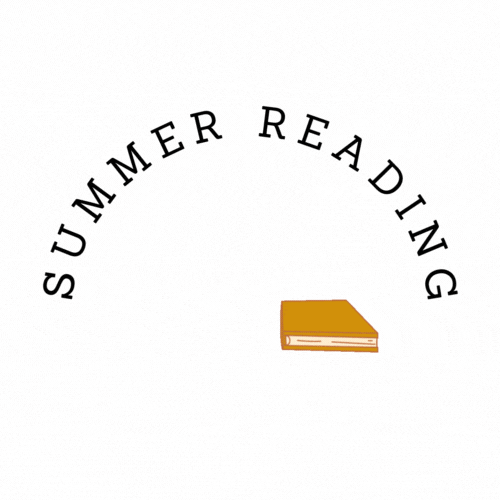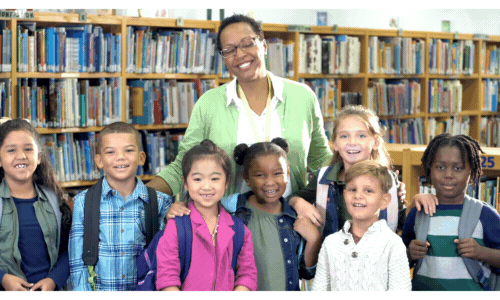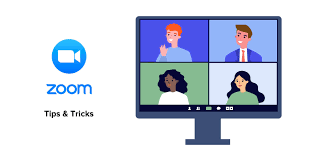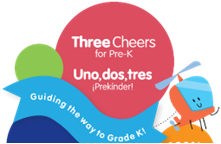Teaching and Learning
Page Navigation
- Department Home
- Literacy - Curriculum and Instruction
- STEM - Curriculum and Instruction
- Multilingual Programs
- Gifted and Talented
- Assessment
- Instructional Resources
- Course Selection Guides and Resources
- School Supply Lists
- Campuses Implementing Standards Based Grading
- Pre-K-1st Grading Guidelines
- State Mandated Recognition Days
- Artificial Intelligence
- Premier Opportunities
-

Introducing the Fort Bend Reads initiative! Our mission: empower our youngest learners and their families with essential early literacy skills beyond the classroom. Through parent engagement and community partnerships, the Literacy Department strives to boost children's listening, speaking, reading, and writing abilities. We're here to meet the demand for at-home literacy resources and nurture lifelong readers.
Resources for Parents and Caregivers
-
Stages of Literacy Development
Understanding the stages of literacy development will help you as a parent/caregiver to recognize benchmark milestones of growth and development. Reaching advanced reading before high school graduation is the goal for all children to ensure they have the skills to read, write, listen, speak, and think beyond high school. This table provides some key milestones in the literacy development of children, as well as, some observable behaviors or actions within each stage.
Stages of Literacy Development
Emergent Literacy
This initial stage is where children develop literacy skills in informal settings, before attending school. This stage typically occurs from birth to age 5 or 6. Parents may see the following pre-reading behaviors:
- Pretends to read books
- Wants others to read to them
- Holds books correctly and plays with them
- Interest in paper and pencils or crayons grows
- Scribbles make believe letters or pretends to write with unrecognizable symbols
- Chants the ABCs without recognizing individual letters
- Recognizes letters in their name
Alphabetic Fluency
Children begin to recognize relationships between letters and sounds. Children will often engage in these activities during this stage:
- Recognizes and reads aloud words they see in print
- Writes phonetically by stretching out the word and represent letters based on sounds they hear
- Points at words as they read aloud
Words and Patterns
This is a transitional stage where a child’s reading fluency improves (the ability o read a text accurately, quickly, and with expression). Children in this stage are beginning to recognize syllables rather than individual letters. Typical behaviors in this stage include:
- Reads without assistance
- Silently reads text rather than aloud
- Uses context clues to consider meaning of new words
Intermediate Reading
Between ages 9-15, children begin to form ideas from what they have read. Reading material comes from a variety of sources and may include textbooks, newspapers, magazines, and trade books. During this stage, reading comprehension operates at the same level as listening comprehension. During this stage, children engage in these experiences:
- Reads to gain new knowledge
- Connects to literacy through the feelings they have based on what they are reading
- Explores issues through reading from various perspectives
- Reads at a faster rate
- Develops strategies for learning new unfamiliar words
Advanced Reading
During this last stage of reading, children can comprehend longer and increasingly complex texts without assistance. Children may demonstrate these behaviors as they reach this stage:
- Reads for many different purposes
- Reads to expand their own interests
- Seeks different perspectives and points of view
- Understands that what they read influeces their opinions
- Makes connections and inferences to gain a deeper understanding of texts read
Adapted from Literacy Development in Children, Maryville University, 6 Apr. 2022, online.maryville.edu/blog/literacy-development-in-children/#:~:text=Alphabetic%20Fluency,Writing%20phonetically.
-
Suggested Questions for Reading Discussions
Each time you read with your child or discuss a text that your child has read, these questions can be used. Discussing a text read helps student not only learn that we read to make meaning, but also we can learn or take something away from the reading.
Questions to ask a young child at the “emergent literacy” or “alphabetic fluency” stages during a read aloud:
-
What do you think might happen in this story? (fiction)
-
What is the character’s name? (fiction)
-
How many words are on the page?
-
What did you like about the text?
-
Does this story remind you of anything in your life? (fiction)
Questions to ask a child at the “words and patterns” stage during reading at home:
-
What is the main problem in this text? (fiction)
-
How was the problem solved? (fiction)
-
Where does the story take place? Why is this setting important in this story? (fiction)
-
Does this text remind you of any other stories you have read?
-
What is the topic of this text? (nonfiction)
-
What does the author want you to learn about this topic? (nonfiction)
Questions to ask a child at the “intermediate reading” stage after reading at home?
-
Does this text remind you of anything that has occurred in our world?
-
Why did the author write this text?
-
How did the main character change through this story? (fiction)
-
What is the main idea of this section of the text? (nonfiction)
-
What details from the text support the main idea? (nonfiction)
-
-
Early Childhood

-
Elementary
-
Middle School
Middle School
Literacy in middle school is a critical phase in a student’s educational journey, as it builds upon the foundational reading and writing skills acquired in earlier grades and prepares students for more complex academic and real-world tasks. Parents and caregivers can support their middle school child by actively contributing in these ways:
- Create a reading-friendly environment. Maintain a home environment with a variety of books and reading materials. Set aside dedicated time for family reading routines where everyone reads together, either silently or aloud.
- Model reading behavior. Be a "reading role model" by reading regularly yourself and sharing your own reading experiences with your child. Discuss what you are reading and why you enjoy it to demonstrate that reading is a valuable and pleasurable activity.
- Discuss books and texts. Engage in discussions about the books your child is reading for school or leisure. Ask questions about the book. Encourage critical thinking by discussing themes, motivations, and what is learned from the text.
- Visit the school or local library. Take regular trips to the library to allow your child to explore different genres and discover new books. Let them choose books that interest them, even if the topics differ from your own preferences.
- Support independent reading. Encourage your child to read independently for enjoyment. Respect their choices and avoid pressuring them to read specific books.
- Provide writing opportunities. Encourage writing beyond school assignments. Encourage them to keep a journal, write short stories, or start a blog. Offer feedback and praise for their writing, focusing on their effort and creativity rather than just the final product.
- Discuss current events and nonfiction texts. Encourage your child to read newspapers, magazines, and online articles. Discuss current events and topics of interest with them. Show them the importance of critically thinking about and staying informed within the digital age.
- Set screen time limits. While technology can offer valuable educational resources, it’s essential to set limits on screen time to ensure there is ample time for reading and other literacy activities.
- Encourage curiosity. Support your child’s natural curiosity by helping them explore their interests through books, online resources, and educational outings.
- Seek help when needed. If your child is in need of support with literacy, consider seeking support from their teachers who can provide additional help and resources. Encourage your child to inquire about tutorials within and beyond the school day, as well as, to communicate with their teachers when they need additional clarity from learning.
Remember that the most important aspect of supporting literacy development is to create a positive and encouraging environment that fosters a love of reading and writing. By showing genuine interest and involvement in your child’s literacy journey, you can help them build a strong foundation for academic success and lifelong appreciation for language and literature.
-
High School
High School
Supporting a high school student's literacy development involves a different approach compared to younger students. High schoolers are often more independent and may have specific literacy needs related to their academic studies, college preparation, and future careers. Here are several strategies parents can use to support their high school students in literacy:
- Promote independent reading. Encourage your student to read for pleasure, and let them choose books that interest them. This can foster a love of reading and improve their literacy skills. Provide access to a variety of reading materials, including novels, nonfiction, newspapers, and magazines.
- Discuss advanced texts. Engage in discussions about the books, articles, and texts your student is reading for school or leisure. Talk about the themes, ideas, and issues raised in the texts. Encourage critical thinking and analysis by asking open-ended questions and exploring different perspectives.
- Support writing skills. Encourage your student to write regularly, whether for school assignments or personal projects. This could include essays, research papers, creative writing, or blogging. Offer feedback on their writing, focusing on areas for improvement and praising their efforts.
- Assist with college and career preparation. Help your student prepare for college entrance exams, such as the SAT or ACT, which include critical reading and writing components. Discuss college and career goals, and explore how strong literacy skills can support their future success.
- Encourage the use of technology. Support your student's use of technology for literacy development, including online resources, educational apps, and digital libraries. Prompt them to critically evaluate online information for accuracy and credibility.
- Facilitate research skills. Help your student develop research skills by guiding them in locating, evaluating, and citing sources for their projects and papers. Encourage the use of academic databases, libraries, and other reliable resources.
- Model lifelong learning. Demonstrate the importance of lifelong learning by continuing to read, write, and learn new things yourself. Share your own experiences with reading, writing, and learning with your student.
- Connect literacy to real-world applications. Discuss how strong literacy skills are essential for various careers and real-world situations. Help your student understand the practical importance of reading and writing.
- Encourage advocacy and communication. Teach your student to advocate for their learning needs and to communicate effectively with teachers and peers.
- Set expectations for academic success. Encourage your student to set high standards for their academic performance and to take responsibility for their learning. Provide support and resources as needed to help them achieve their goals.
- Offer support and encouragement. Acknowledge the challenges and pressures that high school students face, and offer support and encouragement during stressful times. Celebrate their successes and achievements, both big and small.
Supporting a high school student's literacy development is about striking a balance between fostering independence and providing guidance. By showing interest and involvement in your student's literacy journey, you can help them develop the skills and confidence they need for academic success and future opportunities.
Summer Reading and Literacy Supports for Home
-
FBISD Summer Reading
 Summer reading isn't just a seasonal pastime; it's a powerful tool for student growth. When the final school bell rings, diving into books keeps minds engaged and prevents the "summer slide" – the loss of academic skills during vacation. Beyond academics, it fosters creativity, expands vocabulary, and improves comprehension. Whether it's exploring far-off galaxies or solving mysteries with beloved characters, summer reading sparks imagination. It's a chance to read what you love, explore new genres, and develop a lifelong reading habit. So, grab a book, bask in the sun, and embark on a journey that enriches your mind and fuels your passion for learning.
Summer reading isn't just a seasonal pastime; it's a powerful tool for student growth. When the final school bell rings, diving into books keeps minds engaged and prevents the "summer slide" – the loss of academic skills during vacation. Beyond academics, it fosters creativity, expands vocabulary, and improves comprehension. Whether it's exploring far-off galaxies or solving mysteries with beloved characters, summer reading sparks imagination. It's a chance to read what you love, explore new genres, and develop a lifelong reading habit. So, grab a book, bask in the sun, and embark on a journey that enriches your mind and fuels your passion for learning.The purpose of summer reading in FBISD is to engage students in an enjoyable reading experience that maintains and fosters literacy.
-
Community Library Links

Public libraries are invaluable resources that extend learning beyond the classroom. They offer students a world of knowledge, fostering a love for reading, research, and lifelong learning. These local resources provide free access to books, digital resources, and a welcoming space for exploration, making them indispensable for fostering a love of reading.
-
Sora
Sora is your passport to a world of digital books! Sora is an approved Fort Bend ISD eBook platform, designed to make reading fun and accessible. With Sora, you can explore a vast library of eBooks, audiobooks, and more. It's your personal portal to adventure, knowledge, and imagination. Dive in and start your literary journey today!
Soar may be accessed through a students 1Link/Clever account.
-
Resources that support children in prekindergarten
Early Childhood Content for FBISD Reads https://www.fortbendisd.com/Page/113169.
Family Resource
Description

All PreK families are invited to the Online PreK Family Event offered once a month in the morning and evening in English and Spanish via Zoom. Families learn concepts about the current PreK unit of study, child development, and available at-home learning resources to support early literacy and math development.
For an updated list of family events and dates, visit: https://www.fortbendisd.com/Page/122250

PreK Family Newsletter is a monthly department publication that updates the PreK families program curriculum to support early literacy and math, community resources, important dates, and celebrations. This newsletter is available in multiple languages and distributed digitally through multiple platforms such as email, blackboard, and text messaging.
Email us at PreKprogram@fortbendisd.com to register your email and receive our monthly publication.

Savvas Three Cheers for PreK – Uno, dos tres, prekínder are the adopted educational resources aligned to the FBISD PreK units of study. Savvas offers a variety of at-home resources to help your child develop early literacy and math skills, such as ReadyRosie, Unite for Literacy, and games and songs.
Use the FBISD 1LINK app to access the platform. https://www.fortbendisd.com/1Link . Use your email and password to log into Savvas Three Cheers for PreK using your

ReadyRosie is a multilingual digital library with videos that illustrate to parents and children learning at-home activities that are developmentally appropriate and easy to replicate using household items or in places frequently visited by families, such as the supermarket or the park.
Use the FBISD 1LINK app to access the platform: https://www.fortbendisd.com/1Link . You may also ask your child’s teacher for video content recommendations.


Unite for Literacy provides free digital access to picture books narrated in many languages. In this library, children can access books celebrating their languages and cultures while supporting the PreK topic units of study.
Unite for Literacy projects build home libraries and support families to develop daily reading habits, key factors in growing lifelong readers. To access Unite for Literacy, visit: https://www.uniteforliteracy.com/.


CIRCLE Activity Collection: Family in the FBISD PreK program, we believe that families are the first teachers. Many studies suggest that when families and teachers work together to support children’s development, it can lead to better outcomes for children. This collection includes fun, easy activity ideas that families can do together to help support the development of important skills needed for prekindergarten readiness. Access the collection using this link: https://cliengagefamily.org/.
CIRCLE Progress Monitoring Reports: In FBISD, we progress monitor all prekindergarten 4 students with the CIRCLE assessment. Use this guide to understand the components of the report.
"The Parent's Teacher" Podcast
-
About the Podcast
This is a podcast created for parents and caregivers in Fort Bend ISD to support the development of literacy and foster the love for literacy from early childhood through adolescents. The podcast is hosted by leaders of literacy in Fort Bend ISD who work alongside administrators, teachers, students, and parents across our school district. Each episode is designed to feature specific actions to promote literacy outside of the school day.
New podcast episodes are scheduled to be published monthly. Please revisit this site for updates.
Este es un podcast creado para padres y tutores en Fort Bend ISD para apoyar el desarrollo de la lectoescritura y fomentar el amor por la lectura desde la infancia hasta la adolescencia. El podcast está presentado por líderes de alfabetización en Fort Bend ISD que trabajan junto con administradores, maestros, estudiantes y padres de todo nuestro distrito escolar. Cada episodio está diseñado para presentar acciones específicas para promover la lectura fuera de la jornada escolar.
-
Episode 1 - Understanding Early Literacy Development
In this episode, Cheryle Lerch, a leader in the Literacy Department of Fort Bend ISD, helps parents and caregivers understand what early literacy development means, why this is important for future success, and some simple tips on how you can support literacy development at home.
-
Episode 2 - How to talk to your child about those little books that come home
In this episode, Cheryle Lerch, interviews Andrea Light about the little books that come home with your child. Listen to learn about how you can use them to encourage and support reading at home.
-
Episode 3 - New and Diverse Books that Interest Elementary Students
In this episode, Cheryle Lerch and Tamiko Brown explore new and noteworthy book titles that are diverse and interest elementary-aged children. Listen to learn about some of these news titles and where books can be accessed within and outside of our District.
-
Episode 4 - Literacy Books and Genres Oh My!
In this episode, Cheryle Lerch takes listeners on a journey through the different types of books and literary genres. Listen to learn about ways you can encourage your child to reach a variety of genres and how to talk about the genres they are reading now.
-
Episode 5 - The Evolution of Spelling Instruction
In this episode, Cheryle Lerch helps parents understand the current approaches to spelling instruction. Listen to learn about what spelling instruction looks like in today's classroom, and ways you can support spelling skills at home with your children.
-
Episode 6 - Keeping the Literacy Momentum Through the Summer
In the last episode for season one, Cheryle Lerch and Dr. Linda Corbin discuss ways parents and caregivers can encourage literacy through meaningful activities at home over the summer months.
FBISD Reads Webinar - Coming Soon
-
Webinars

